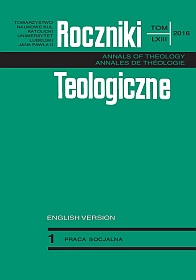The Subject of Creatio Continua and Its Ecclesial Aspect
Abstract
It is God who is the subject of creatio continua; in Christianity it is a triune God. Fundamentally divine nature, Divine Persons: God the Father, God the Son and the Holy Spirit, who in the logic of the internal life of the Trinity is third and in relation to the world the most direct. The personal specificity of the Third Divine Person predestines it to activity, creativity, to stirring creative power and action in created beings. The Holy Spirit develops and unites, creates the interior of the beings, combines them and strengthens the link with the Creator.
This ongoing creation is encoded in the act of creation and is in keeping with the workings of Providence, which also is a creation of the Trinity, and indirectly a creation of people: individuals and societies.
Participation in the act of creation stands in proportion to the growth in holiness, which means it is proportional to becoming a person. Created beings personalize themselves through participation in creatio continua, and by participating in this act, they personalize themselves. All this is implemented though the activity of the intellect, will and emotions.
It is Jesus Christ in his capacity of God and man who occupies the centre stage of the ongoing creation.
References
Alvarez Gomez J. C.M.F. “La permanente novedad de la vida consagrada en la Iglesia”. Confer 4 (1992).
Balthasar Hans U. von. “Trójca Święta a stworzenie.” In Kosmos i człowiek (Kolekcja Communio 4) edited by Lucjan Balter, K. Czulak, P. Góralczyk, Poznań−Warszawa: Pallottinum, 1989.
Bartnik, Czesław S. Gromy mówiące. Kazania, przemówienia, publicystyka społeczno-polityczna (Dzieła Zebrane, vol. 5). Lublin: Standruk, 1999.
Bartnik Czesław S. Dogmatyka katolicka, vol. 1. Lublin: Redakcja Wydawnictw KUL, 2000.
Coda, Piero. “Pentecostés.” In Diccionario Teológico. El Dios cristiano, edited by Xabier Pikaza and Nereo Silanés, 1061-1072. Salamanca: Secretariado Trinitario, 1992.
Cruz Hernández, Miguel. Historia del pensamiento en Al-Andalus (2). Historia (Biblioteca de la Cultura Andaluza). Sevilla:, Editoriales Andaluzas Unidas, 1985.
Fernández Ardanaz, Santiago. “A la búsqueda del paradigma original del hombre. Gen 1,26 y 2,7 en los pensadores cristianos del s. II,” Scriptorum Victoriense 35 (1988), no. 2, 30-113.
Fueyo, Jesús. La vuelta de los Buddas. Madrid: Organización Sala Editorial S.A, 1973.
Gonzáles Montes, Adolfo. Religion y nacionalismo, la doctrina luterana de los dos reinos como teología civil (Estudios vol. 51). Salamanca: Universidad Pontificia de Salamanca, Bibliotheca Salmantinensis, 1982.
Greshake, Gisbert. Der Dreieine Gott. Eine trinitarische Theologie. Freiburg im Br.: Verlag Herder, 20073. Translated by Jan Tyrawa. Wrocław: TUM, 2009.
Kowalczyk, Marian, SAC. “Opatrzność Boża w ujęciu personalistycznym,” Communio 6 (2002), 117-129.
Laurentin, André. “Le Pneuma dans la Doctrine de Philon,” Ephemerides Theologicae Lovanienses 27 (1951), 390-437.
Lavaud, Laurent. “Opatrzność otwarta na ryzyko wolności,” Communio 6 (2002), 104-116.
Liszka, Piotr. “Teologia historii zbawienia.” In Ku mądrości teologii, edited by Krzysztof Góźdź, Edward Sienkiewicz, 159-169. Szczecin: Wydział Teologiczny Uniwersytetu Szczecińskiego, 2008.
Ochman, Jerzy. Historia filozofii żydowskiej, vol. 2: Średniowieczna filozofia żydowska. Kraków: Universitas, 1995.
Reutt, Marian. “Przedmowa.” In Nowe średniowiecze by Mikołaj Bierdiajew, 5-11. Komorów: Antyk, 1997.
Schall, James V., TJ. “On the Reality of Fantasy.” In Tolkien: A Celebration, ed. Joseph Pearce. San Francisco: Ignatius Press, 1999, 72-77. Translated by Joanna Kokot. Poznań: Zysk i S-ka, 2003.
Siemieniewski, Andrzej. Ścieżką nauki do Boga. Nauki przyrodnicze i duchowość w starożytności i w średniowieczu. Wrocław: Fronda, 2009.
Tolkien, John R. R. “On Fairy-Stories.” In John R. R. Tolkien, The Monsters and the Critics: And Other Essays, edited by Christopher Tolkien. London: HarperCollins, 2007. Translated by Joanna Kokot. Poznań: Zysk i S-ka, 2000.
Tourpe, Emmanuel. “Duch, natura, pośredniczenie.” In Duch Odnowiciel (Kolekcja Communio 12), 101-115. Poznań: Pallotinum, 1998.
Copyright (c) 2016 Roczniki Teologiczne

This work is licensed under a Creative Commons Attribution-NonCommercial-NoDerivatives 4.0 International License.





